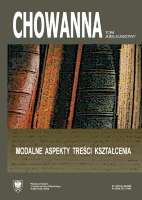Paradygmat edukacji podmiotowej w kontekście analiz modalnościowych
Paradigm of subjective education in the context of modal analyses
Author(s): Aleksandra MinczanowskaSubject(s): Social Sciences
Published by: Wydawnictwo Uniwersytetu Śląskiego
Keywords: subjective education; theory of didactic activity; modality; early-school education
Summary/Abstract: Despite a long-lasting period of emphasizing double-subjective teaching and studying process (in which a pupil should be involved), any changes in the pedagogic theory are very slow. Reasons of this seem to underlie teachers’ intellectual possibilities, knowledge, experience as well as their motivation, aspirations, attitudes and views. In the article, a profile of a contemporary teacher is shown as a director of the paradigm of subjective education assumptions. The article also contains some directives with reference to teachers’ conduct if they desire to put the principles of this paradigm into practice. That means two dimensions of the educational sphere are presented: a realistic one formed by the introduction of the results of my own research over practical realization of the assumptions the paradigm mentioned above. The other educational sphere is a potential one, shown through the formulation of directives, dictates, necessities connected with teachers’ conduct if they desire to put the principles of this subjective educational paradigm into practice. Considering these facts, the modal context of issues presented in the article is obvious. Achieved changes in many cases turn out superficial, put into practice only in a partial way, that means inconsistent and disorganized one. You can think that if you create nice atmosphere, smile or do a nice gesture to your students, you will solve the problem. It is not enough. Contemporary knowledge “to be nice and helpful one to another” emphasizes the fact, that a human-being is somebody when he or she becomes himself or herself. Then, the educational process becomes continuous experience and searching for and creating own personality at the same time. In such process of education teachers’ attitudes towards students cannot remain unchanged.
Journal: Chowanna
- Issue Year: 2009
- Issue No: Jubilee
- Page Range: 141-151
- Page Count: 11
- Language: Polish

